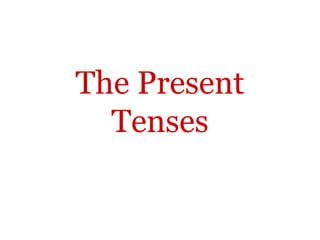The present tenses
•
1 gefällt mir•854 views
This document discusses the four present tenses in English: the present simple, present continuous, present perfect, and present perfect continuous. It explains how each tense is used to refer to present, future, or past time frames and situations. Context clues like time adverbials help determine when to use the present continuous for future arrangements. The present simple is also used for future schedules. Subordinate clauses often refer to future time relative to the main clause. Questions and negatives of the present simple add the auxiliary "do".
Melden
Teilen
Melden
Teilen

Empfohlen
Empfohlen
Weitere ähnliche Inhalte
Was ist angesagt?
Was ist angesagt? (20)
Relative clauses. defining and non defining presentacion

Relative clauses. defining and non defining presentacion
Ähnlich wie The present tenses
Ähnlich wie The present tenses (20)
Mehr von lcslidepresentations
Mehr von lcslidepresentations (20)
Presentations: Openings signposting survival techniques

Presentations: Openings signposting survival techniques
The present tenses
- 1. The Present Tenses
- 2. The Present Tenses • There are four tenses that begin with a verb in the present tense. • The present simple • The present continuous • The present perfect • The present perfect continuous
- 3. The Present Tenses • The present simple and the present continuous are used with reference to present time. • If you are talking about the general present or about a regular or habitual action, you use the present simple. George lives in Birmingham. They often phone my mother in London.
- 4. The Present Tenses • If you are talking about something in the present situation, you use the present continuous. He is playing tennis at the University. I’m cooking the dinner.
- 5. The Present Tenses • The present continuous is often used to refer to a temporary situation. He’s living in a flat at present.
- 6. The Present Tenses • You use the present perfect or the present perfect continuous when you are concerned with the present effects of something which happened at a time in the past, or which started in the past but is still continuing. Have you seen the film at the Odeon? We’ve been waiting here since two o’clock.
- 7. The Present Tenses • If you are talking about something which is scheduled or timetabled to happen in the future you can use the present simple tense. The next train leaves at two fifteen in the morning. It’s Tuesday tomorrow.
- 8. The Present Tenses • If you are talking about something which has been arranged for the future, you can use the present continuous. When you use the present continuous like this, there is nearly always a time adverbial like ‘tomorrow’, ‘next week’, or ‘later’ in the clause. The Brown’s are having a party next week.
- 9. The Present Tenses • It is only in main clauses that the choice of tense can be related to a particular time. In subordinate clauses, for exampel ‘if’-clauses, time clauses, and defining relative clauses, present tenses often refer to a future time in relation to the time in the main clause. You can go at five, if you have finished.
- 10. The Present Tenses • The present simple tense normally has no auxiliary verb, but questions and negative sentences are formed with the auxiliary ‘do’. Do you live round here? Does your husband do most of the cooking? They don’t often phone during the week.